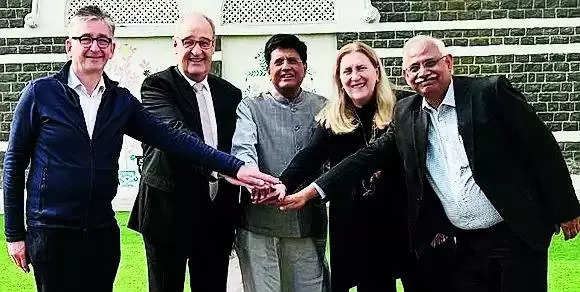NEW DELHI: European Free Trade Association (EFTA), the four-nation trading bloc comprising Switzerland, Norway, Iceland and Liechtenstein, is close to signing a trade agreement with India after commerce minister Piyush Goyal and Swiss economics minister Guy Parmelin settled some of the thorny issues that had been holding up a deal, which was seen as one of the easier ones to clinch.
“The main points on which we have reached agreement include, for example, patent protection, which was controversial in the past, as well as a new type of investment promotion chapter. The text is still to be finalised. The negotiations have not yet been finalised. Both parties have agreed not to disclose the details,” a spokesperson for the Swiss department of economic affairs told TOI.
The bilateral investment protection agreement with EFTA could also set the tone for other trade deals, including the UK, where negotiations have not been completed as the finance ministry has been reluctant to deviate from the “model treaty” cleared by the Union cabinet a few years ago, which has been a sore point with almost all countries.
Switzerland was keen on lower import duty for gold, a demand that New Delhi had virtually rejected. India’s goods trade with the bloc was pegged at $17.2 billion, with imports from EFTA estimated at just over $16 billion during April-November and well on its way to beat last fiscal year’s level of $16.7 billion. Of the $16 billion imports so far this year, over $13 billion was accounted for by gold.
Parmelin travelled directly from Davos to Mumbai to finalise the agreement. “… After 16 years of negotiations we found balanced solutions to the main open issues of the EFTA-India trade agreement… Our teams are working around the clock to settle the last details so that it can be signed as soon as possible,” the minister tweeted on Sunday.
Indian officials said that the broad outlines have been worked out. “Following extensive negotiations, a shared understanding has been achieved on key issues during the ministerial meeting. Ongoing efforts are now focused on shaping the convergence that has emerged,” an Indian government official said.
In Mumbai, Goyal said Parmelin flew on a whistlestop tour to India for 12 hours, with negotiations going into early morning. “Talks are progressing very fast. They want to scale up investments, get Indian products on a large scale and increase trade, which will generate employment for lakhs of Indians,” he said. With Switzerland, India’s key trading partner among the EFTA nations, removing industrial tariffs, observers said, there is little gain for domestic exporters on the goods trade side, barring the odd farm product, which will face stringent checks.
After deciding to end talk for joining the Regional Comprehensive Economic Partnership (RCEP) agreement, India has been on an FTA overdrive of sorts.
“The main points on which we have reached agreement include, for example, patent protection, which was controversial in the past, as well as a new type of investment promotion chapter. The text is still to be finalised. The negotiations have not yet been finalised. Both parties have agreed not to disclose the details,” a spokesperson for the Swiss department of economic affairs told TOI.
The bilateral investment protection agreement with EFTA could also set the tone for other trade deals, including the UK, where negotiations have not been completed as the finance ministry has been reluctant to deviate from the “model treaty” cleared by the Union cabinet a few years ago, which has been a sore point with almost all countries.
Switzerland was keen on lower import duty for gold, a demand that New Delhi had virtually rejected. India’s goods trade with the bloc was pegged at $17.2 billion, with imports from EFTA estimated at just over $16 billion during April-November and well on its way to beat last fiscal year’s level of $16.7 billion. Of the $16 billion imports so far this year, over $13 billion was accounted for by gold.
Parmelin travelled directly from Davos to Mumbai to finalise the agreement. “… After 16 years of negotiations we found balanced solutions to the main open issues of the EFTA-India trade agreement… Our teams are working around the clock to settle the last details so that it can be signed as soon as possible,” the minister tweeted on Sunday.
Indian officials said that the broad outlines have been worked out. “Following extensive negotiations, a shared understanding has been achieved on key issues during the ministerial meeting. Ongoing efforts are now focused on shaping the convergence that has emerged,” an Indian government official said.
In Mumbai, Goyal said Parmelin flew on a whistlestop tour to India for 12 hours, with negotiations going into early morning. “Talks are progressing very fast. They want to scale up investments, get Indian products on a large scale and increase trade, which will generate employment for lakhs of Indians,” he said. With Switzerland, India’s key trading partner among the EFTA nations, removing industrial tariffs, observers said, there is little gain for domestic exporters on the goods trade side, barring the odd farm product, which will face stringent checks.
After deciding to end talk for joining the Regional Comprehensive Economic Partnership (RCEP) agreement, India has been on an FTA overdrive of sorts.
